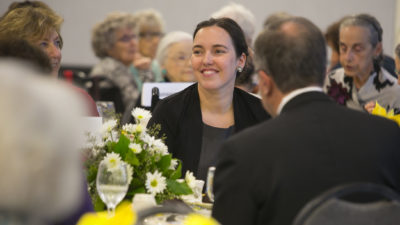Scholar reveals how people’s hearts were touched
We have been told by poets and playwrights that music has the power to soothe and quiet us and bring peace to our souls. Dr. Kristin Griffeath knows another side of music – how the notes and lyrics can transform us into patriots with bloodlust in our hearts and hatred on our tongues.
Griffeath is a graduate of the Conservatory of Music and Dance at the University of Missouri-Kansas City. At the August 14 Carolyn Benton Cockefair Chair luncheon, Griffeath sang period songs, exhibited archived sheet music covers and played recordings that illustrated the effective and efficient use of music to sell American participation in World War I to an undecided public.
Talented songwriters such as George M. Cohan and John Phillip Sousa, beloved performers and recording artists like Enrico Caruso and Al Jolson, and movie and Broadway stars issued “a musical call to arms,” said Griffeath, a voice and music history professor at Southwestern Oklahoma State University. At Liberty Bond rallies and other public venues, celebrities dressed in American regalia – as nurses, soldiers, the Statue of Liberty or Uncle Sam – and familiarized audiences with catchy tunes and lyrical hooks.
Griffeath carefully broke down the elements of cover design, song titles and especially the lyrics themselves, that shifted public opinion from neutral to all-out war fervor. Sheet music combined an appeal to pride with memories of fallen leaders like George Washington and Andrew Jackson and the sacrifices made by our forefathers. “Kaiser Bill” and “the Huns” were held up for ridicule and loathing.
The words asked Americans to “answer duty’s call,” remember “Old Glory” and think about their “mothers, wives and sweethearts.” The music itself was simple, most written in march tempo in a major key, and easy to sing by amateurs who heard the melody on the piano.
Every American military training camp had a song leader, charged with offering the men a healthy release valve other than drink or women. The men themselves wrote parodies and humorous songs. Favorites were collected in a 15-cent booklet, the first music book ever published by the United States government.
Dr. Richard Williams, assistant professor of piano and voice at the Conservatory, accompanied Griffeath; and her husband, Dr. Robin Griffeath, assistant professor of voice at Southwestern Oklahoma State University, sang as well.
“Songs were filled with ‘we’ and ‘our boys’ and runs of notes from Sousa marches and familiar songs like the ‘Marseillaise.’ No matter your personal situation, you felt connected to the war effort. Piano sales jumped and portable crank-type gramophones, suitable for use in a trench, were popular items. People’s hearts were touched,” Griffeath said.
She earned her master’s and doctorate degrees in musicology and voice performance at UMKC, and her award-winning research contributed to the exhibit, “Harmonies of the Homefront,” at Kansas City’s National World War I Museum.

